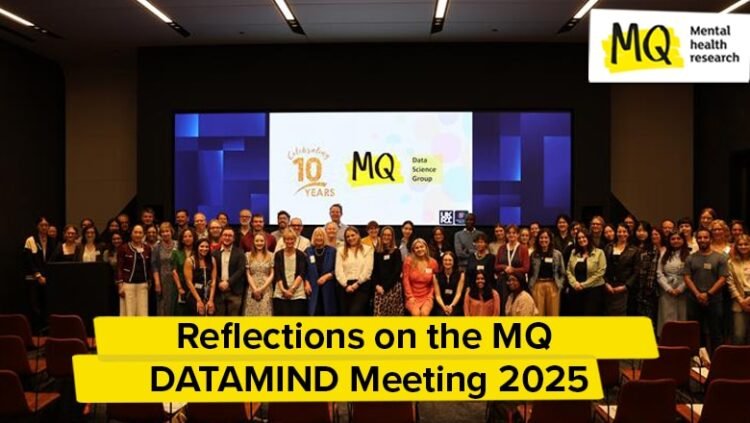This weblog was written for MQ by Dr Amy Ronaldson.
In Might 2025, the MQ DATAMIND Knowledge Science biannual assembly came about on the London HQ of Deutsche Financial institution. As an MQ Analysis Fellow, I used to be excited to attend and acquire insights from main researchers, clinicians, coverage makers, and people with lived expertise of psychological well being challenges.
About me
I’m Amy, an MQ Analysis Fellow utilizing giant quantities of routinely collected well being information to know an infection outcomes in individuals with extreme psychological sickness. Psychological well being information science is central to my work, making this assembly a useful house to alternate data, share experiences, and study from others within the discipline. I by no means miss it!
The occasion featured displays, panel discussions, and Q&A periods spanning profession levels and disciplines. A number of key themes emerged at this assembly which I imagine replicate the route of journey inside psychological well being information science:
The position of Synthetic Intelligence (AI) in psychological well being information science
With AI quickly advancing, I used to be keen to listen to the way it’s being utilized inside psychological well being information science. Dr. Elizabeth Ford outlined how AI is presently getting used, from administrative purposes to forecasting affected person wants and predictive modelling to improvements equivalent to AI-driven remedy and medical scribes. Whereas promising, important issues stay. Psychological well being information is commonly extremely delicate, recorded in unstructured codecs, and might include surprising identifiers. This makes information safety and knowledgeable consent crucial.
Public attitudes appear typically supportive of opt-out fashions if information is securely de-identified, however the nuances of psychological well being data—equivalent to prior misdiagnoses and modifications in diagnostic standards—pose challenges for AI interpretation. Bias in data, notably relating to LGBTQ+ people, homeless populations, and gender disparities, dangers reinforcing current inequalities.
Ford argued that whereas AI can help clinicians, remaining selections ought to stay with human consultants to keep away from exacerbating biases or unintended penalties.
Early Profession Researcher Insights
For me, the early profession researcher (ECR) flash displays are at all times the spotlight of MQ conferences. Showcasing the subsequent technology of expertise in psychological well being information science provides a worthwhile glimpse into the rising traits and future route of the sphere.
One key theme that emerged from the ECR displays was the recurring problem in psychological well being information science of polypharmacy and nuanced prescribing patterns. Flash talks touched on many facets of this problem from assessing drug interactions (e.g. metformin and antipsychotic-induced weight acquire), to the appliance of enormous language fashions to measure patterns in antidepressant remedy. Big efforts are being made to know one of the simplest ways to leverage prescribing information inside psychological well being information science.
Machine studying versus conventional epidemiology
Professor Honghan Wu examined how deep studying fashions carry out on psychological well being prediction duties, combining structured digital well being data with unstructured textual content. Unstructured textual content inside well being data is a large, considerably untapped, useful resource inside psychological well being information science. A panel dialogue in direction of the tip of the afternoon about the usage of scientific textual content in analysis sparked a lot debate, notably round machine studying vs conventional epidemiology. One key query emerged: Can AI outperform standard strategies when coping with complicated datasets? The consensus gave the impression to be that machine studying has benefits in terms of dealing with giant quantities of knowledge however nonetheless wants cautious oversight to make sure necessary nuance is just not missed.
Knowledge Sharing & the Way forward for Psychological Well being Science
Professor Andrew McIntosh gave a compelling speak on the way forward for collaborative psychological well being analysis within the UK. He offered challenges in information harmonization, noting that growing dataset sizes via collaboration has unlocked insights into genetic underpinnings of psychiatric problems. The dialogue emphasised the significance of replicability, ample pattern sizes, and the invaluable efforts by organizations like MQ and DATAMIND to enhance information governance.



